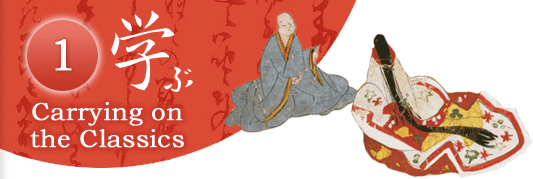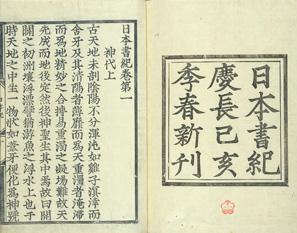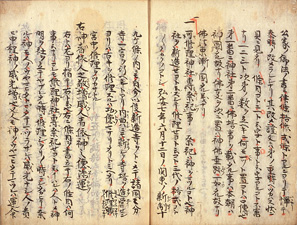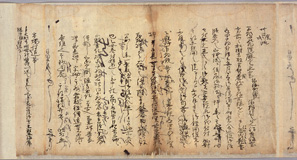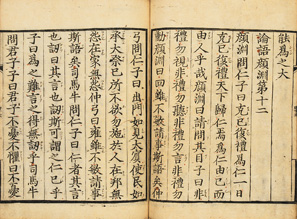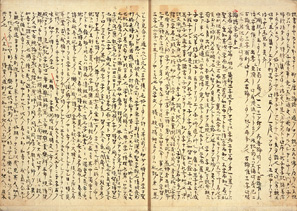Old movable-type edition. Keicho imperial edition. Volumes I and II of history books compiled in 720, the part of Japanese mythological age, were selected and newly published by the order of Emperor Goyozei (1571 to 1617). The exhibits are specially bound large books.
Home > 1. Carrying on the Classics > History and Chinese Books 1
21. Nihon shoki
- Volume I to Volume II, by Toneri shinno, printed in the 4th year of the Keicho Era (1599), 1 book, 29.9
 21.0cm <WA7-251>
21.0cm <WA7-251>
22. Shikimoku sho
- copied in early modern period(16th-17th century), 2 books (bound in one volume), 26.4
 18.8cm <WA16-123>
18.8cm <WA16-123>
This is an annotated book of Goseibai shikimoku (Joei shikimoku). Goseibai shikimoku is a basic law established in 1232 by the Kamakura Shogunate. This law was respected as the norm of samurai families for generations.
23. Yasutomi ki
- written by Nakahara Yasutomi, written from the 8th year of the Oei Era (1401) to the 1st year of Kosho Era (1455), 93 scrolls, 30.3cm in length <WA27-2>
These are the diaries of Nakahara Yasutomi (around 1400 to 1457), a Confucian scholar working for the Imperial Court in the 15th century as an official. Original diaries written by the author. These diaries are important historical materials to know the political, economic, social and cultural conditions in the 15th century. The author often referred to the progress in studying classics.
24. Rongo (Lun yu)
- 10 volumes, printed by Asaino families (of Sakai) in the 2nd year of the Tenbun Era (1533) [as described in the afterword], 2 books (bound in one volume), 27.6
 21.2cm <WA6-90>
21.2cm <WA6-90>
This is the second oldest edition of Rongo (Analects of Confucius) in Japan after the first version printed in 1364. The exhibit is one of the first printed books: Such early printed books exist in only a few copies today.
25. Rongo kikigaki
- 10 volumes, lectured by Kiyohara Naritada, noted by Ten'in Ryutaku, copied in the 4th year of the Tenbun Era (1535), 2 books, 29.0
 21.9cm <WA16-9>
21.9cm <WA16-9>
The lectures on Rongo by Kiyohara Naritada (1409 to 1467), who was famous as the top Confucianist of that time, was recorded by Ten'in Ryutaku (1422 to 1500), a Zen Buddhist monk who attended the lectures.

